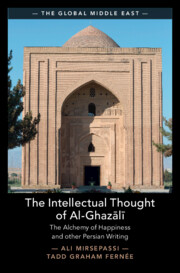Book contents
- The Intellectual Thought of Al-Ghazālī
- Reviews
- The Global Middle East
- The Intellectual Thought of Al-Ghazālī
- Copyright page
- Contents
- Acknowledgments
- Note on Transliteration
- Introduction
- 1 The Time and Life of Ghazālī
- 2 Reading Ghazālī in the West
- 3 The Poetic Imagination and the Politics of Ambiguity
- 4 The Troubled Orthodoxy in the Academic Study of Islam
- 5 A Path to Reform
- 6 A Cosmopolitan Reading of Ghazālī
- 7 Ghazālī’s Practical Ethics
- Bibliography
- Index
7 - Ghazālī’s Practical Ethics
Dīn and Dunyā
Published online by Cambridge University Press: 16 January 2025
- The Intellectual Thought of Al-Ghazālī
- Reviews
- The Global Middle East
- The Intellectual Thought of Al-Ghazālī
- Copyright page
- Contents
- Acknowledgments
- Note on Transliteration
- Introduction
- 1 The Time and Life of Ghazālī
- 2 Reading Ghazālī in the West
- 3 The Poetic Imagination and the Politics of Ambiguity
- 4 The Troubled Orthodoxy in the Academic Study of Islam
- 5 A Path to Reform
- 6 A Cosmopolitan Reading of Ghazālī
- 7 Ghazālī’s Practical Ethics
- Bibliography
- Index
Summary
This chapter analyzes the core elements of Ghazālī’s practical ethics, using The Alchemy of Happiness, a guidebook for Muslims wishing to live a good life in this world (dunyā) while striving toward salvation through faith (dīn). Ghazālī prescribed a pragmatic attitude toward fiqh prioritizing everyday practice and recognized dīn and dunyā as two interconnected but distinct spheres, which he joined through a broadly conceived Islamic ethics. Ghazālī criticized the Sufi tendency to decry all knowledge. In The Alchemy of Happiness, he understood that people held distinct responsibilities, and in turn embedded “responsibility” in the diverse economic and political institutions essential to the functioning of the Abbasid Empire. Ghazālī conceived of the “heart” (dil) as a selective intelligence permitting differentiation among ethical alternatives. His view did not prescribe utilitarian obedience to divine command. For Ghazālī, everyday human need, interaction, and conviviality provided reason to appreciate God’s work. Obedience is not the primary source of correct religious conduct, then, but a disposition of kindness in everyday life.
- Type
- Chapter
- Information
- The Intellectual Thought of Al-Ghazālī , pp. 208 - 238Publisher: Cambridge University PressPrint publication year: 2024

